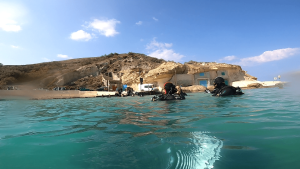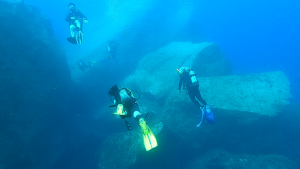Every diver usually wants the air to last long and the dive lasts as long as possible. After all, the underwater world is amazing, and the more time we can spend underwater, the better. But every diver's body and experience is different, and so each person consumes air at a different speed.
However, there are some things a diver can do to improve air consumption after Open Water Diver completion of the course. Learn how to do this for tips from a diver instructor.
- Do you want your compressed air, 200BAR, balloon to last longer? The first advice given by PADI diving instructor Valtera Preimanis is, you need to dive more, keep practicing diving and you will succeed. The more you dive, the better you feel underwater, and it also reduces, improves air consumption.
- Reduce speed. If you are tense and make rapid movements under water, it will increase your air consumption. Allow the body to relax and adjust to the aquatic environment and follow the flow. Only move your fins when needed. By doing this, you will stay under water longer.
- If you want to relax underwater, look for a suitable place to stop or stop and simply enjoy the beauty of the surrounding marine habitats. When you are seduced by the splendor of the deep sea, you will begin to feel relaxed, reducing air consumption.
- We breathe calmly and deeply. When diving, the worst thing you can do is breathe fast, short, shallow. Think of yoga and breathe slowly and deeply, both inhaling and exhaling. Practice it at home to get used to this type of deep breathing. Remember what you learned at your instructor's course at the Scuba Diving Club: "Never hold your breath or try to reduce your air intake by holding your breath!”
- Neutral buoyancy is very important. Learning to be neutral is a skill that requires a lot of practice, but it will pay off with excellent air consumption. Ideally, you stay at a safety stop, at a depth of 6 meters, with about 50 bar in a balloon and without air BC. If you have difficulty staying at the desired depth because it is not properly balanced - when you breathe in and out of the BC - it obviously does not retain air.
- Consider registering PADI Peak Performance Buoyancy, in the specialized neutral buoyancy course, in the diving club "Diving".
- Equipment is likely to leak, keep an eye on it and notify your partner if he has a leak. An easy way to stop air consumption is to look at the equipment: reduce air leaks. Check o-rings, pressure gauge connection, BC inflation hose and other connection points. Use a spare regulator in case you find anything damaged while diving.
- Diver's position in the water. The most effective way to reduce resistance while swimming is to maintain a horizontal position. This reduces air consumption. The more vertical you are, the more air you will inevitably consume. If you have difficulty staying horizontal, adjust the weight, tank and BC position.
- If you are worried that your dive will be short, remember to take off and dive shallower to save air. You can always move a few meters up to use less air.
- It may seem logical, but while diving, take the time to relax and unwind and enjoy the diving experience. Keep up with the current, as they say, and avoid unnecessary fuss.
- Do not allow the diver's accessory, such as a flashlight or spare regulator, to hang from the equipment. Items hanging from a diver will cause significant water resistance, require more force and energy to move and increase air consumption.
Where in Latvia can you go scuba diving?
🤿😀 If you are looking for help, call PADI diving instructor Valters Preimanis t. 220-77-202 to find advice and start scuba diving.


